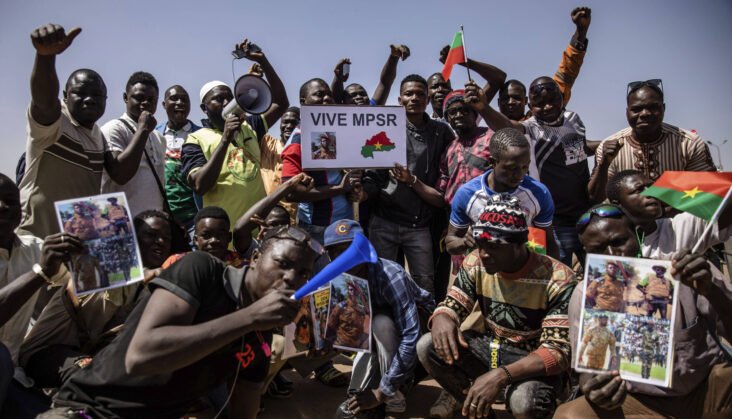By Eric Olander
Chinese Foreign Ministry spokesman Zhao Lijian responded on Tuesday to the military overthrow of democratically-elected Burkinabé President Fas Roch Marc Christian Kaboré with a call to “restore normal order” and “resolve differences through dialogue.”
Zhao, speaking at the regular foreign ministry press briefing in Beijing, also noted that the embassy in Ouagadougou issued a standard security alert for its nationals in the country and added that “China will spare no effort to protect the safety of (the 500) Chinese citizens in the country.”
While Zhao’s comments are not unusual, they do mark a stark contrast with the Foreign Ministry’s response to last September’s coup in Guinea.
At that time, spokesperson Wang Wenbin was unequivocal in his denunciation of the military’s toppling of the government: “China opposes coup attempts to seize power,” Wang also demanded that deposed President Alpha Condé be immediately released from custody.
One reason for Beijing’s more subdued response to this latest coup may be that, unlike both Guinea and Sudan, China doesn’t have any pressing strategic interests in Burkina Faso. Guinea, in contrast, is one of China’s largest suppliers of bauxite and in Sudan, China owns a sizable share of the country’s oil industry.

In fact, ties between Burkina Faso are still relatively new, dating back only to 2018 when the Burkinabé government switched diplomatic allegiances from Taiwan to China. The two sides were edging closer last summer to Burkina Faso joining the Belt and Road Initiative and other than a $94m Huawei Smart City project, there aren’t many other large-scale infrastructure projects currently in development.
Even in terms of Covid-19 vaccines, China’s engagement with Burkina Faso has been comparatively limited, with only 400,000 doses distributed to date.
So, it shouldn’t be a big surprise that China’s muted response to Tuesday’s news, compared to other military coups in Africa over the past year. Actually, the little that Zhao said is a return to normalcy, given Beijing’s traditional reluctance to comment about coups as it did in Myanmar last year and previously in countries like Thailand and Zimbabwe. In all those cases they largely remained quiet.Africa InsightWake up to the essential with the Editor’s picks. Sign upAlso receive offers from The Africa ReportAlso receive offers from The Africa Report’s partners
Backgrounder: What’s behind China’s muted response to military coups around the world
- Non-interference doctrine: The foundational reason for China’s reluctance to comment when a government is forcibly overthrown is rooted in its longstanding view that however bad a coup is, it’s still the internal affair of another country and not subject to any external critique. With the exception of the Foreign Ministry’s remarks following the coup in Guinea, China’s been largely consistent on this and that likely explains why Zhao said as little as possible on the matter when asked on Tuesday.
- The “do unto others principle”: It often comes as a surprise to many that China is not following the example of the US and European powers who often feel a moral obligation to publicly condemn coups, civil wars, and other atrocities that may occur within a country — but are purely domestic in nature. As an adjunct to the non-interference doctrine, China refrains from such condemnations because it does not want to provide the justification for the US, Europeans, and others to do the same in return. So, even well-documented human rights violations that occur within China, in Beijing’s view, should not be subject to external scrutiny because China avoids such criticisms of other countries’ internal affairs.
This article was published in partnership with The China Africa Project.
Credit | The Africa Report

